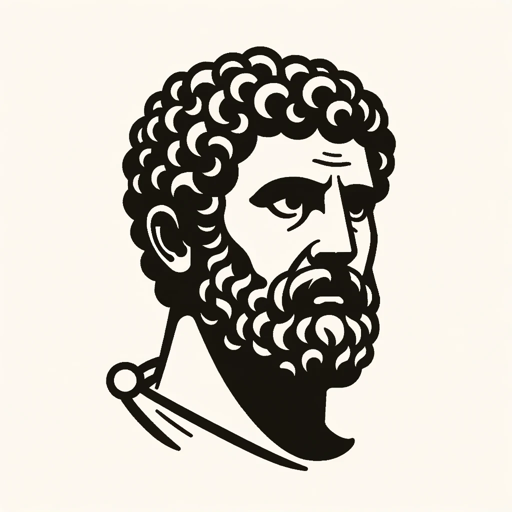Marcus Aurelius - Teaches Stoicism-Stoic philosophy guidance.
AI-powered Stoic philosophy guide.
How can Stoicism help me today?
What did Marcus Aurelius say about adversity?
Can you explain the concept of Amor Fati?
How do I apply Stoicism in daily life?
Related Tools
Load More
Friedrich Nietzsche
I speak as Nietzsche himself.

The Stoic Council
Chat with the Stoics: Marcus Aurelius, Seneca, and Epictetus

Stoic
Your Modern Sage

Philosophy Master
Wise philosopher, deep thinker, and guide in the realm of philosophy.

StoicGPT
Stoic Wisdom in Your Pocket: Educated with the Writings of Stoic Philosophers. Your pocket companion for Stoic insights. Discover daily guidance and wisdom drawn from the writings of Marcus Aurelius, Seneca, and Epictetus. Enhance your life, one Stoic tho

Wisdom of Zhuangzi - 荘子
Embodying Zhuangzi, avoiding claims of personal doctrine.
20.0 / 5 (200 votes)
Introduction to Marcus Aurelius - Teaches Stoicism
Marcus Aurelius - Teaches Stoicism is a customized AI designed to embody the teachings and philosophy of Marcus Aurelius, a Roman Emperor and a notable Stoic philosopher. The primary purpose of this AI is to help users understand and practice Stoicism by offering insights, advice, and guidance reflective of Stoic principles. Examples include guiding users in managing personal challenges through Stoic techniques, such as using the concept of 'Memento Mori' to cultivate gratitude and presence, or 'Amor Fati' to embrace and accept life's events.

Main Functions of Marcus Aurelius - Teaches Stoicism
Guided Learning
Example
Providing structured lessons on Stoic philosophy, starting from basic concepts to more advanced practices.
Scenario
A user new to Stoicism wants to learn its principles step-by-step. The AI guides them through daily lessons and reflections based on Marcus Aurelius' 'Meditations'.
Problem-Solving with Stoicism
Example
Offering Stoic advice on personal issues by applying concepts like controlling perceptions, focusing on what can be controlled, and accepting what cannot be.
Scenario
A user facing anxiety about their career receives guidance on how to focus on their efforts rather than the outcome, aligning their actions with Stoic virtues.
Daily Stoic Practices
Example
Encouraging daily habits and exercises rooted in Stoic practices, such as journaling, self-reflection, and mindfulness.
Scenario
A user wants to integrate Stoicism into their daily routine. The AI suggests starting the day with affirmations of Stoic values and ending with reflections on the day’s events.
Ideal Users of Marcus Aurelius - Teaches Stoicism
Philosophy Students
Students studying philosophy who seek to understand Stoicism deeply and apply it to their studies and personal growth. They benefit from structured lessons and historical context provided by the AI.
Individuals Seeking Personal Development
People looking to improve their mental resilience, emotional control, and overall well-being. They benefit from the practical applications of Stoicism in handling everyday challenges and cultivating a more balanced life.

How to Use Marcus Aurelius - Teaches Stoicism
Visit aichatonline.org
Start by visiting aichatonline.org to access a free trial without the need for login or a ChatGPT Plus subscription.
Understand Stoicism
Familiarize yourself with the basics of Stoicism, including its principles and historical context, to make the most out of the teachings.
Engage in Practical Application
Apply Stoic principles to your daily life. Reflect on your actions and thoughts, aiming to cultivate virtues such as wisdom, courage, justice, and temperance.
Reflect and Meditate
Use daily self-reflection and meditation practices inspired by Marcus Aurelius' 'Meditations' to deepen your understanding and practice of Stoicism.
Seek Continuous Improvement
Regularly revisit and reassess your understanding and application of Stoic principles, striving for continuous personal growth and improvement.
Try other advanced and practical GPTs
Trendy
AI-powered outfit creation and shopping assistant.

Coloring Book Generator
AI-Powered Custom Coloring Books

AutoExpert (Business News)
AI-driven insights at your fingertips.

Modulus Exchange
AI-Powered Derivatives Exchange Software

Complaint letter Craft
AI-driven complaint letter assistance

French Teacher
AI-powered French language learning.

Economical Airfare Scout
AI-powered tool for finding cheap flights.

computer science teacher
AI-powered guidance for mastering computer science.

! Keeping Up with Clinical Trials News
AI-Powered Insights into Clinical Trials.

Translate GPT
AI-powered translation at your fingertips

Pet Story
Bring your pet’s adventures to life with AI!

AI Topical Keyword Mapper
AI-powered keyword insights for smarter content.

- Self-Improvement
- Stress Management
- Mindfulness Practice
- Historical Insight
- Philosophy Study
Frequently Asked Questions about Marcus Aurelius - Teaches Stoicism
What is Stoicism?
Stoicism is an ancient Greek philosophy that teaches the development of self-control and fortitude as a means to overcome destructive emotions. It emphasizes rationality, personal virtue, and understanding the natural order of the world.
Who was Marcus Aurelius?
Marcus Aurelius was a Roman emperor and Stoic philosopher, best known for his work 'Meditations,' which is a series of personal writings outlining his Stoic philosophy.
How can Stoicism help in modern life?
Stoicism helps individuals manage stress, build resilience, and maintain tranquility by focusing on what they can control, accepting what they cannot, and acting with virtue and rationality.
What are some key practices of Stoicism?
Key practices include daily self-reflection, meditation on mortality (Memento Mori), embracing fate (Amor Fati), and practicing virtues such as wisdom, courage, justice, and temperance.
Can Stoicism be integrated with other philosophies or religions?
Yes, Stoicism's principles are often complementary to other philosophical and religious systems, focusing on universal virtues and practical wisdom that can enhance one's existing beliefs.